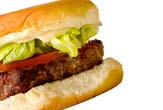Fast-Food Should Be Served with Fat-Busting Meds, Study Says

A burger and an order of fries ought to be served up with a side of cholesterol-busting medication, researchers say.
To help neutralize the heart-disease dangers that fatty food poses, fast-food restaurants could provide customers with free statins, which are drugs prescribed to lower cholesterol levels, according to a study by researchers at Imperial College London published this week.
Statins work by reducing the amount of unhealthy "LDL" cholesterol in the blood, and many studies have shown them to be highly effective at lowering a person’s risk of a heart attack, according to the researchers.
"Statins don't cut out all of the unhealthy effects of burgers and fries. It's better to avoid fatty food altogether, study researcher Dr. Darrel Francis said in a statement. "But we've worked out that in terms of your likelihood of having a heart attack, taking a statin can reduce your risk to more or less the same degree as a fast-food meal increases it."
Francis added, "It's ironic that people are free to take as many unhealthy condiments in fast-food outlets as they like, but statins, which are beneficial to heart health, have to be prescribed."
Statins could be handed out like ketchup packets, the researchers say, because they are very safe drugs to take. However, a small proportion of regular statin users do experience significant side effects, with problems in the liver and kidneys reported in between 1-in-1,000 and 1-in-10,000 people.
"When people engage in risky behaviors like driving or smoking, they're encouraged to take measures that minimize their risk, like wearing a seatbelt or choosing cigarettes with filters. Taking a statin is a rational way of lowering some of the risks of eating a fatty meal," Francis said.
Sign up for the Live Science daily newsletter now
Get the world’s most fascinating discoveries delivered straight to your inbox.
Studies have shown a clear link between total fat intake and blood cholesterol, which is strongly linked to heart disease, according to the researchers. Recent evidence suggests that trans fats, which are found in high levels in fast food, are the component of the Western diet that is most dangerous in terms of heart-disease risk.
The researchers used data from a previous study to quantify how a person's risk of a heart attack increases with their daily intake of total fat and trans fat. They compared this risk with the decrease in risk from various statins, based on other previous studies.
The results showed that most statin regimes are able to compensate for the relative risk increase from eating a cheeseburger and drinking a small milkshake.
The researchers noted that studies should be conducted to assess the potential risks of allowing people to take statins freely, without medical supervision, and suggested the inclusion of a warning that emphasizes no tablet can substitute for a healthy diet, and advises people to consult their doctor for more advice.
The study will be published on Aug. 15 in the American Journal of Cardiology.










